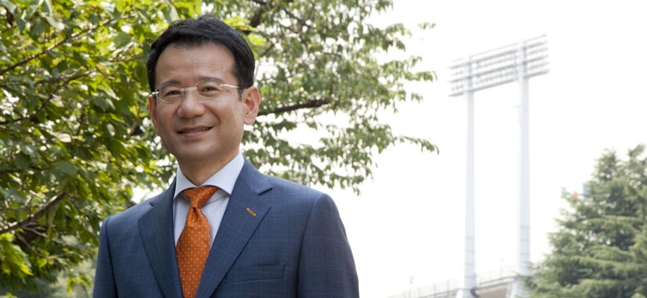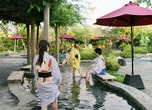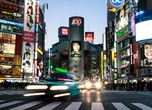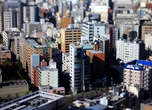Forget the economy: this is the Olympics
DPJ politician Kan Suzuki talks about Tokyo’s 2020 Olympic Games bid

Posted: Wed Feb 27 2013
You can't have missed the posters around town advertising Tokyo's bid to host the 2020 Olympic Games, beating out Madrid and Istanbul and fulfilling the dreams of former governor Shintaro Ishihara. From March 4-7, the International Olympic Committee will be dispatching its Evaluation Commission here, to see whether the capital's plans bear closer scrutiny. Local media have already been trumpeting an estimated ¥3 trillion economic effect from the Games, but what impact would they have on the everyday lives of Tokyoites? We sat down with DPJ politician Kan Suzuki – a childhood football fanatic and lifelong proponent of sports, who's now part of the Olympic bid committee – to get his views.
This is being billed as the 'eco-friendly Games'. Would you say that's a typically Japanese concept?
Exactly. God dwells in the details, as the saying goes, and it's a Japanese speciality to fine-tune things and put heart into those small places. Japanese people are connected to the water, greenery and forests, and we ought to transmit our ideas about ecology to the rest of the world. [In our Olympic plans] the National Stadium in Kasumigaoka – which was built in 1960 – will be reconstructed under the concept of 'The Park', and have its capacity increased to 85,000 people. That area is literally the garden of Jingu-Gaien and Meiji-Jingu, and just five minutes by car from the Imperial Palace. To have a park-stadium of that size, in the middle of the city – it'll be the first of its kind in the world.
While keeping in harmony with the surrounding nature, there'll also be revolutionary AV and ICT equipment installed in this next-generation stadium. For example, there'll be 300 cameras put in place, allowing you to capture athletes from every angle possible and create a complete, 360-degree image. We've also got 30 supercomputers nationwide, in universities and national institutes, which can be connected to form the world's largest supercomputer network. It's called HPCI (Hyper-Performance Computer Infrastructure), and it would mean that the enormous volume of data captured at the National Stadium could be distributed over the internet in real-time video data, and viewed around the world. Hundreds of projectors can be embedded in the field and trace a virtual image – just like the Haunted Mansion at Disneyland. That's only available in Japan. In addition to the Games, one push of a button can switch to other entertainment like concerts, athletics, football... That's Cool Japan right there, isn't it?
So you're going beyond just saying 'We can host the Olympics!' and showing how technology and philosophy will lead the way?
Beijing in 2008 was just joining the ranks of developed countries, but when London hosted the Olympics for the second time in 2012, it showed us the intangible value of leading civilisation, or graduating from the modern era. The next one is in Rio de Janeiro, part of the BRICs – and after China, Sochi in Russia and Brazil, India must come next. [Laughs.] Of course that kind of Olympics is great, but I think the Olympic movement in the 21st century must be different from in the 20th century. London was brilliant in that sense: it didn't just demonstrate modernisation, but showed the value of ties in the community; the depth of musical culture; the importance of rich communication; and the joy of getting together in one place. I believe the Olympics and World Cup are a world peace summit. At the G20, you only see the heads of 20 countries, but you get representatives from dozens and dozens of countries gathering at the opening ceremony of the Olympic Games. Of course, there may be conflicts between each nation, but during the Games the world is connected as one through sports.
When Tokyo hosted the Olympic Games in 1964, the city's appearance completely changed. What's the change in the year 2020?
I was actually born in 1964. When our grandchildren look back in 2050, I hope that they don't just see outdated facilities, but rather that they see something which started thanks to the Olympic Games in 2020. I'm talking about a sports community. Until now, people have been gathered in places like companies, but from now on, I want to create a society for everyone, where everyone can participate in the community and lead healthy, cultural lives through sports. The 20th century had an 'our company' spirit: this needs to be changed to 'our town', 'our Shibuya', 'our Omotesando'. Surveys clearly show that people who join a sports club have a stronger emotional attachment to their community compared to those who don’t. You need to feel like you're building a community with friends who also live in the community. I want people to be thinking 'My Life, Our Life'. Everyone can think about 'My Economy' and 'Our Economy', obsessing about the economy, and that’s a problem. That’s the reason people are losing confidence after our GDP sank to third place, because they don't have anything to be proud of other than the economy.
I think it was Adobe Systems who did a survey of five countries last year – the US, Japan, Germany, UK and France – asking them about the most creative city in the world. Tokyo ranked first: Japan was voted the most creative country. But most Japanese people don't think that way. When the BBC surveyed people about which countries have the most positive impact on the world, they chose Japan. People outside the country evaluate Tokyo and Japan very positively. So I want us to design Tokyo's future ourselves, and create it by ourselves. That's not a task for any old person: it's for citizens. A city is built by its citizens. It's like a quiet civic revolution… I want to create that kind of history.
You mean the Olympics would help overhaul society as a whole?
London has used the Olympics to revitalise the city over the past decade, with the concept of 'Rebranding Britain'. I want to make Tokyo an open platform for creation. Not many people are going to appreciate this, but I think if the chairs in the National Stadium were created by a young designer and had a label saying 'designed by…', or if you engraved the names of donors on the wall – even if it’s just a small doorknob, I like the idea of someone putting thought into designing that doorknob, and of it catching on and eventually becoming popular around the world. It’s not about how much you can get as a design fee, that sense of commercialism – it’s more about creating a piece of world history. There'll be opportunities for young people, and I feel that a new type of social business can be born. The visible economic effects may seem short-lived, but the wider returns will come 10 or 20 years later.
Kan Suzuki profile
Born in 1964. Attended Nada High School in Kobe, then graduated from the Department of Public Law, University of Tokyo. Joined the Ministry of International Trade and Industry in 1986, where his responsibilities would include government IT policy, e-commerce, and information and communication technologies in education, as well as the establishment of the J.League and hosting of the 2002 World Cup. He also taught at Keio University and Chuo University. In 2001, he was elected to the House of Councillors as a representative for Tokyo. Equally known for his extra-curricular activities, he was on the winning team in the Kobe high-school football league, and was actively involved in choirs and musicals while at university. He formed the Coro Maschile Roppongi choir with composer Shigeaki Saegusa in 1999, and in 2007 released an album with his band, Suzukan Revolution.
For further details about the Tokyo 2020 Olympic bid see http://tokyo2020.jp/en/
Tweets
- About Us |
- Work for Time Out |
- Send us info |
- Advertising |
- Mobile edition |
- Terms & Conditions |
- Privacy policy |
- Contact Us
Copyright © 2014 Time Out Tokyo














Add your comment